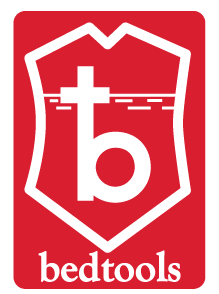bamtobed¶
bedtools bamtobed is a conversion utility that converts sequence alignments
in BAM format into BED, BED12, and/or BEDPE records.
Usage and option summary¶
Usage:
bedtools bamtobed [OPTIONS] -i <BAM>
(or):
bamToBed [OPTIONS] -i <BAM>
| Option | Description |
|---|---|
| -bedpe | Write BAM alignments in BEDPE format. Only one alignment from paired-end reads will be reported. Specifically, if each mate is aligned to the same chromosome, the BAM alignment reported will be the one where the BAM insert size is greater than zero. When the mate alignments are interchromosomal, the lexicographically lower chromosome will be reported first. Lastly, when an end is unmapped, the chromosome and strand will be set to “.” and the start and end coordinates will be set to -1. By default, this is disabled and the output will be reported in BED format. |
| -mate1 | When writing BEDPE (-bedpe) format, always report mate one as the first BEDPE “block”. |
| -bed12 | Write “blocked” BED (a.k.a. BED12) format. This will convert “spliced” BAM alignments (denoted by the “N” CIGAR operation) to BED12. Forces -split. |
| -split | Report each portion of a “split” BAM (i.e., having an “N” CIGAR operation) alignment as a distinct BED intervals. |
| -splitD | Report each portion of a “split” BAM while obeying both “N” CIGAR and “D” operation. Forces -split. |
| -ed | Use the “edit distance” tag (NM) for the BED score field. Default for BED is to use mapping quality. Default for BEDPE is to use the minimum of the two mapping qualities for the pair. When -ed is used with -bedpe, the total edit distance from the two mates is reported. |
| -tag | Use other numeric BAM alignment tag for BED score. Default for BED is to use mapping quality. Disallowed with BEDPE output. |
| -color | An R,G,B string for the color used with BED12 format. Default is (255,0,0). |
| -cigar | Add the CIGAR string to the BED entry as a 7th column. |
Default behavior¶
By default, each alignment in the BAM file is converted to a 6 column BED. The BED “name” field is comprised of the RNAME field in the BAM alignment. If mate information is available, the mate (e.g., “/1” or “/2”) field will be appended to the name.
$ bedtools bamtobed -i reads.bam | head -3
chr7 118970079 118970129 TUPAC_0001:3:1:0:1452#0/1 37 -
chr7 118965072 118965122 TUPAC_0001:3:1:0:1452#0/2 37 +
chr11 46769934 46769984 TUPAC_0001:3:1:0:1472#0/1 37 -
-tag Set the score field based on BAM tags¶
One can override the choice of the BAM MAPQ as the result BED record’s score
field by using the -tag option. In the example below, we use the -tag
option to select the BAM edit distance (the NM tag) as the score
column in the resulting BED records.
$ bedtools bamtobed -i reads.bam -tag NM | head -3
chr7 118970079 118970129 TUPAC_0001:3:1:0:1452#0/1 1 -
chr7 118965072 118965122 TUPAC_0001:3:1:0:1452#0/2 3 +
chr11 46769934 46769984 TUPAC_0001:3:1:0:1472#0/1 1 -
-bedpe Set the score field based on BAM tags¶
The -bedpe option converts BAM alignments to BEDPE format, thus allowing
the two ends of a paired-end alignment to be reported on a single text line.
Specifically, if each mate is aligned to the same chromosome,
the BAM alignment reported will be the one where the BAM insert size is greater
than zero. When the mate alignments are interchromosomal, the lexicographically
lower chromosome will be reported first. Lastly, when an end is unmapped, the
chromosome and strand will be set to “.” and the start and end coordinates will
be set to -1.
Note
When using this option, it is required that the BAM file is sorted/grouped by the read name. This allows bamToBed to extract correct alignment coordinates for each end based on their respective CIGAR strings. It also assumes that the alignments for a given pair come in groups of twos. There is not yet a standard method for reporting multiple alignments using BAM. bamToBed will fail if an aligner does not report alignments in pairs.
$ bedtools bamtobed -i reads.ba -bedpe | head -3
chr7 118965072 118965122 chr7 118970079 118970129 TUPAC_0001:3:1:0:1452#0 37 + -
chr11 46765606 46765656 chr11 46769934 46769984 TUPAC_0001:3:1:0:1472#0 37 + -
chr20 54704674 54704724 chr20 54708987 54709037 TUPAC_0001:3:1:1:1833#0 37 +
One can easily use samtools and bamToBed together as part of a UNIX pipe. In
this example, we will only convert properly-paired (FLAG == 0x2) reads to
BED format.
$ samtools view -bf 0x2 reads.bam | bedtools bamtobed -i stdin | head
chr7 118970079 118970129 TUPAC_0001:3:1:0:1452#0/1 37 -
chr7 118965072 118965122 TUPAC_0001:3:1:0:1452#0/2 37 +
chr11 46769934 46769984 TUPAC_0001:3:1:0:1472#0/1 37 -
chr11 46765606 46765656 TUPAC_0001:3:1:0:1472#0/2 37 +
chr20 54704674 54704724 TUPAC_0001:3:1:1:1833#0/1 37 +
chr20 54708987 54709037 TUPAC_0001:3:1:1:1833#0/2 37 -
chrX 9380413 9380463 TUPAC_0001:3:1:1:285#0/1 0 -
chrX 9375861 9375911 TUPAC_0001:3:1:1:285#0/2 0 +
chrX 131756978 131757028 TUPAC_0001:3:1:2:523#0/1 37 +
chrX 131761790 131761840 TUPAC_0001:3:1:2:523#0/2 37 -
-split Creating BED12 features from “spliced” BAM entries.¶
bedtools bamtobed will, by default, create a BED6 feature that represents
the entire span of a spliced/split BAM alignment. However, when using the
-split command, a BED12 feature is reported where BED blocks will be
created for each aligned portion of the sequencing read.
Chromosome ~~~~~~~~~~~~~~~~~~~~~~~~~~~~~~~~~~~~~~~~~~~~~~~~~~~~~~~~~~~~~~~~
Exons *************** **********
BED/BAM A ^^^^^^^^^^^^....................................^^^^
Result =============== ====
